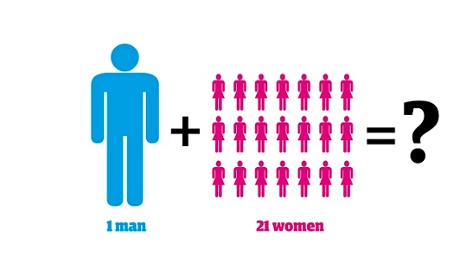
Good news, supposedly, for Gene Simmons (4,600), Mick Hucknall (3,000) and Nick Clegg (up to 30): sleeping with more than 20 women, a new study has suggested, protects men against prostate cancer.
According to researchers at the University of Montreal, who followed more than 3,000 men over a four-year period, those who had slept with more than 20 women were nearly a third less likely to get the disease – while virgins were almost twice as likely to get it. (The findings didn’t hold up for men who slept with men. Having more than 20 male partners doubled the risk.)
Just think, guys: now a notch on the bedpost isn’t just another sign of your continuing retreat from commitment – it’s a way of ensuring that your lonely old age spent wishing that someone would call will last even longer. The explanation, claims lead researcher Dr Marie-Elise Parent, is not to do with the number of partners in itself, but the frequency of ejaculation that Casanovas tend to enjoy. (Of course, that means that those who have kept the flame alive in long-term relationships will enjoy the same benefits – as will those who, um, take matters into their own hands.)
The trouble for Mick, Nick and Gene, though, is that not everyone is convinced. Dr Mieke Van Hemelrijck, lecturer in cancer epidemiology at King’s College London, has doubts about the methodology of the study. “Sexual activity was assessed with an interview,” she points out, “so we can’t be sure that men with prostate cancer didn’t reply in a different way to men without prostate cancer.”
Owen Sharp, chief executive of Prostate Cancer UK, agrees. “If I’m being generous, I think the research is very limited and the headlines are borderline dangerous,” he says.
Against the idea that frequency of ejaculation makes you healthier, Van Hemelrijck suggests it could just as easily be that having a lot of partners correlates with “health-seeking behaviour” – that is, people who seek out sexual variety also generally take better care of themselves. “The only clearly established risk factors are age, family history and ethnicity,” she says, with older black men whose fathers also had the disease being right in the danger zone, however many women they have had sex with. If you are in a high-risk group, you’re probably going to do yourself more good by simply going to your GP.
There is, Van Hemelrijck adds, another vital matter: men with long-term partners are much more likely to go for screening, and hence to find out about the cancer quickly if they do have it. Which raises a prospect that will please believers in family values: it probably isn’t, after all, that you’re less likely to get cancer if you sleep around. It’s that you’re more likely to nip it in the bud if you don’t.

